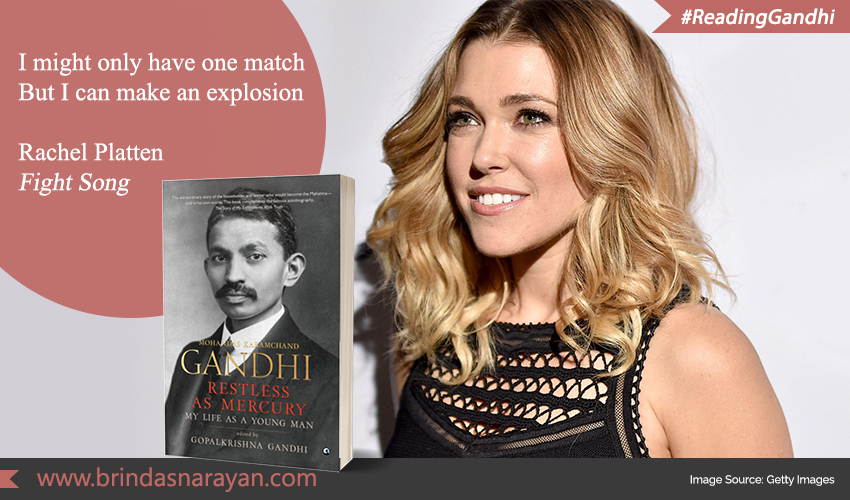
Reading Gandhi: Channelizing Anger To Change History
Gandhi in Durban: Sticking To His Turban
When Gandhi reached Durban in 1893, he was just a recently graduated newbie lawyer. In his own words: “I was just a boy returned from England wanting to make some money.” But he already bore a remarkable degree of self-confidence in himself and his culture. He wasn’t willing to relinquish aspects of himself merely to bow to the diktats of another place. Just think of this: South Africa was a new and foreign country to him. He was eager to establish his law practice and to prove his mettle to his client. Yet, being himself, superseded all else.
When he was taken to the Durban court, and to the presence of the magistrate, he was to demonstrate an obduracy and defiance that was to mark his character for many years to come. Moreover, to start making political statements through his dressing style. On that day, towards the end of May, 1893, Gandhi was wearing “a frock coat and a turban.” When he entered the court, the magistrate glared at his turban, with an discernible distaste for his headwear. “The magistrate kept staring at me and finally asked me to take off my turban. This I refused to do and left the court.”
Left the court? Even when he had everything to lose, he wasn’t willing to give into a relatively cosmetic ask from the South African authorities. The next day, the newspaper implied that Gandhi had offended the magistrate. Responding at once with a letter that both apologized for the unintended offence and simultaneously defended his action, Gandhi wrote: “Just as it is a mark of respect amongst the Europeans to take off their headdress, in like manner it is in Indians to retain one’s headdress…”
The Journey To Pretoria: Thrown Out of the Train
The stubborn clinging on to his turban was only a precursor to what was going to be a more seminal event: his train journey to Pretoria. As Gandhi starts out with his own simple and lucid account of the ride: “For the train journey I had a first-class ticket.” He was seated peacefully in the first class, when some Europeans spotted his intrusion into what they conceived of as their space. They complained to the railway staff and when Gandhi reached Maritzburg, a guard ordered him to retreat to the van compartment. The merely 23-year-old Gandhi produced his ticket and refused to move out. He was physically hurled out of the train along with his luggage.
At the Maritzburg station, he shivered in the cold. He was also fearful, like anyone else would be. “I was afraid for my very life. I entered the dark waiting room. There was a white man in the room. I was afraid of him.” In that room, he made a decision that was to change world history. He wondered, like any young adult might at such a turning point, if he should just return to India. To warm, familiar faces, that would accept him for who he was. Of if he should opt for the tougher path, of staying on in South Africa and struggle against forces that seemed pitted against him? “I decided to stay and suffer. My active non-violence began from that date.”
Traveling Intentionally by Third Class
Many years later, when Gandhi returned to India in 1915, he would travel widely across the country, by train, and always by third class. His resolve to occupy the first class in South Africa was met with equal resolve to witness his own country, from the perspective of the poorest and most marginalized. As Professor Vinay Lal of UCLA writes: “Few Indians of his time, or indeed since, acquired the knowledge of India that Gandhi was to gain by his travels, and there can scarcely be any Indian who had criss-crossed the country by train as much as Gandhi had done.”
Remembrance At Petermaritzburg
In 1997, there was a ceremony at the Petermaritzburg Railway Station. At that event, Gandhi’s grandson, Gopalkrishna Gandhi, who was then the nation’s High Commissioner to South Africa, received the Freedom of Petermaritzburg. The event was presided over by the legendary Nelson Mandela. In his speech, the eloquent Gopalkrishna Gandhi said: “When Gandhi was evicted from the train, an Indian visiting South Africa fell but when Gandhi rose, an Indian South African rose.”
You Can Choose to Forgive Without Forgetting
In the contemporary context, and in sometimes more trivial situations, we are often urged to forgive those who insult or hurt us in some manner. But taking a leaf from the leader’s life, I suggest you forgive the offender – a private process targeted at your internal wellbeing – without forgetting the injustice or putdowns. Instrumentalize the simmering anger or unstated comebacks to fuel your ambition or motivation. Recent research suggests that anger generates norepinephrine, a neurotransmitter that triggers our “fight or flight” response. If generated at moderate levels, it can energize us to heightened levels of performance.
After all, if Gandhi could use an insult to topple an empire, we can like the singer Rachel Platten suggests in the Fight Song, light our little matches to send “big waves into motion.” As Platten puts it in her immensely invigorating song:
And all those things I didn’t say
Wrecking balls inside my brain
I will scream them loud tonight
Can you hear my voice this time?
References
Gandhi: Restless as Mercury, ed. by Gopalkrishna Gandhi, Aleph 2021
https://www.lyrics.com/lyric/31853065/Rachel+Platten/Fight+Song




